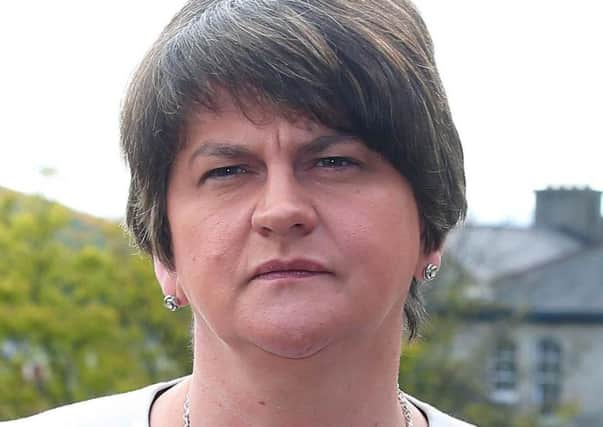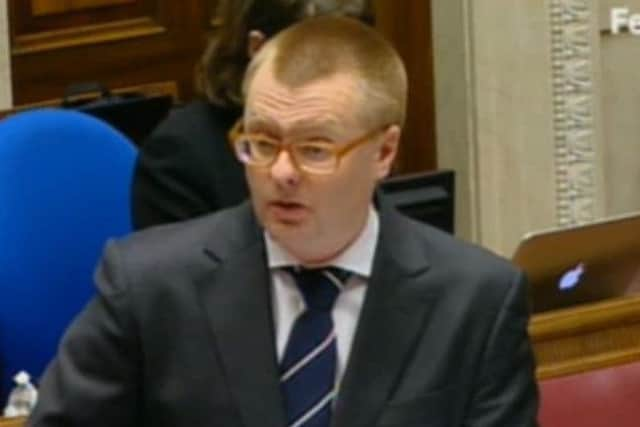RHI inquiry: Foster '˜did not pass on key costs warning'


The email was from businesswoman Janette O’Hagan, who contacted the minister via her personal email address at a point in September 2013 when there were still few RHI claimants and the absence of cost controls could have been addressed before the huge surge in demand began in 2015.
Ms O’Hagan – who has been referred to as a whistleblower but describes herself as a “concerned citizen” who observed a problem – will speak publicly for the first time about the issue at the inquiry tomorrow.
Advertisement
Hide AdAdvertisement
Hide AdYesterday counsel for the inquiry Joseph Aiken highlighted to chairman Sir Patrick Coghlin that Ms O’Hagan – who ran an energy efficiency business and had noticed a drop in demand for her products from boiler owners who no longer wanted to conserve energy – had contacted the department in the middle of its consultation on both expanding the scheme and introducing cost controls.


Ultimately, Mrs Foster’s Department of Enterprise, Trade and Investment (DETI) dropped its own recommendation to introduce cost controls and instead prioritised the expansion of the scheme, something which remains to be fully explained.
Ms O’Hagan first contacted the department in August 2013 but her explicit warning that RHI was already being abused came in a September 3 email to Mrs Foster.
The businesswoman warned Mrs Foster in the email that “it pays them [claimants] to use as much [heat] as they can ... the incentive to use more is leading to misuse in some cases”.
Advertisement
Hide AdAdvertisement
Hide AdMr Aiken said that the email “appears not to have been forwarded by minister Foster to her departmental officials; however an earlier but perhaps less forthright email from Ms O’Hagan to minister Foster’s ... same personal address, seems to have been forwarded to DETI from the minister’s iPad.”


He went on: “If it’s the case that the second email dated September 3 was not forwarded to DETI officials by the minister, the inquiry will want to look at why that was.
“Mrs Foster comments in her witness statement that Ms O’Hagan’s concerns weren’t escalated to ministerial level and the panel may wish to consider whether Ms O’Hagan’s email dated September 3 sent to, yes, Mrs Foster’s personal email address, constituted an escalation of concerns to ministerial level.”
Mr Aiken said that Mrs Foster’s old department had said in its evidence that the email was “first seen by DFE officials in March 2017 – more than three and a half years after it was originally sent”.
Advertisement
Hide AdAdvertisement
Hide AdHe said that Ms O’Hagan did have a meeting with senior DETI official Fiona Hepper and two other key civil servants working on the scheme, Peter Hutchinson and Joanne McCutcheon, but did not meet the minister, as she had requested.
However, although Ms O’Hagan provided an agenda for the meeting, Mr Aiken said that there appeared to be “no contemporaneous minutes of the meeting”.
He said that she had told the inquiry in writing that “I felt that they didn’t share my concerns that people would abuse the system; it was clear that my concerns would not be further investigated”.
The inquiry also heard fresh concerns about the quality of advice being given to Mrs Foster by her officials, adding to a picture of inaccurate, misleading or significantly incomplete information being put before the DUP minister.
Advertisement
Hide AdAdvertisement
Hide AdAnd Mr Aiken said that the inquiry also appears to have identified the first point at which the department decided to prioritise expanding the scheme over implementing cost controls.
He said that a submission from senior official Fiona Hepper to Mrs Foster in late 2013 gave a description of phase two of the scheme but crucially “there’s no longer a mention of cost control”.
Inquiry chairman Sir Patrick Coghlin also heard how just a year into the scheme Ofgem, which was running RHI for DETI, gave the department figures which showed that there had been 85 applicants, 78 of whom were running boilers on the most lucrative tariff, many of which appeared to be in use around the clock. But despite this information, DETI did not seem to query why their estimates of usage – and subsidies – were so far out.